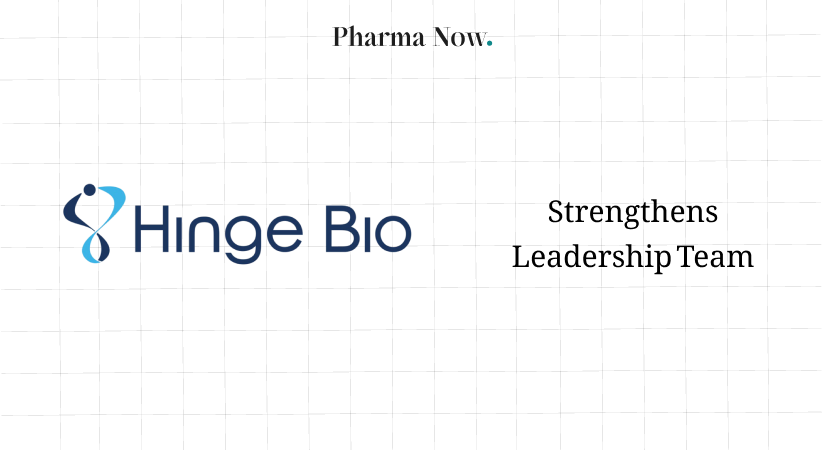Hinge Bio Strengthens Leadership Team To Advance GEM-DIMER™ Programs, Publishes Key Data In Scientific Reports
Hinge Bio expands leadership, publishes preclinical proof-of-concept data for HB2198 targeting autoimmune diseases.
Breaking News
Sep 05, 2025
Simantini Singh Deo

Hinge Bio, Inc., a privately held biotechnology company focused on the discovery and development of innovative multi-specific medicines, has announced the expansion of its leadership team along with the publication of preclinical proof-of-concept data for its lead program, HB2198. The data, published in Scientific Reports, demonstrates the potential of HB2198 to achieve strong and deep B cell depletion, offering a promising approach for treating autoimmune diseases such as systemic lupus erythematosus.
As part of its leadership expansion, the company has welcomed three highly experienced biotechnology professionals. Paul Brunetta, M.D., has joined as Chief Medical Officer. Dr. Brunetta was most recently Senior Vice President of Clinical and Translational Science at Sana Biotechnology and continues to serve as Adjunct Associate Professor in the Pulmonary and Critical Care Division at the University of California, San Francisco (UCSF). He previously held the role of Senior Vice President of Translational Science at Juno Therapeutics and spent 15 years at Genentech, where he served as Global Head of the Anti-CD20 Immunology Program.
Over the course of his career, he has overseen the design, monitoring, and execution of clinical trials in a wide range of therapeutic areas, including neurology, nephrology, rheumatology, immunology, pulmonary medicine, and transplantation. At Genentech, he also directed the Clinical Research Fellowship program for 12 years. Dr. Brunetta completed his medical training at Johns Hopkins University and Tufts University School of Medicine, followed by his internship, residency, and fellowship at UCSF, where he later joined the faculty.
Kristen Quigley has been appointed Chief Clinical Operations Officer. She brings nearly three decades of clinical research experience, including extensive leadership in phase I–IV clinical trials. She has held senior and executive roles at Molecular Templates, Inc. and Threshold Pharmaceuticals, as well as at ICON plc, where she co-directed operations in the Nordic region and managed large-scale clinical trial portfolios for multiple clients.
Her therapeutic expertise spans autoimmune diseases, renal failure, and oncology. Ms. Quigley has consistently contributed to building organizational value and adaptability in both biotech companies and contract research organizations. She holds a bachelor’s degree from Washington University in St. Louis.
The company has also appointed Alpana Naresh, Ph.D., as Vice President of CMC Strategy and Manufacturing. Dr. Naresh most recently served as Executive Director of CMC Operations at Harpoon Therapeutics, later transitioning to Merck following its acquisition of Harpoon. At Harpoon, she contributed to the development, transfer, and manufacturing of novel T-cell engager molecules, including those from the TriTAC® and ProTriTAC™ platforms.
Her career also includes roles at Boehringer Ingelheim, JSR Life Sciences, Sutro Biopharma, and Genitope, as well as post-doctoral fellowships at Stanford University and the University of Virginia. With more than 25 years of experience in research and development, she has worked extensively on biomolecules such as monoclonal antibodies, bispecific and trispecific antibodies, and immunoglobulins for cancer vaccines. Dr. Naresh completed her master’s degree in biotechnology at CCSHAU, her doctorate in biotechnology at IMTech in Chandigarh, and post-doctoral research at Stanford University.
Barry Selick, Ph.D., Chief Executive Officer, stated, “Hinge Bio is committed to developing life-changing medicines for patients with intractable diseases. We are excited to expand our management team with seasoned biotech leaders to drive our novel GEM-DIMER™ programs through clinical development. We also appreciate the recognition by Scientific Reports of the differentiated efficacy data demonstrated with HB2198 to durably deplete memory B cells, which is evidence of a key mechanism of action for multiple autoimmune indications, including SLE.”
In a joint statement, Dr. Brunetta, Ms. Quigley, and Dr. Naresh also added,“We are incredibly excited to join Hinge Bio and contribute to its mission by advancing novel multi-specific GEM-DIMER™ programs into and through clinical development. Hinge Bio’s groundbreaking approach represents a major step forward for differentiated off-the-shelf multi-specifics to address significant unmet medical needs in autoimmunity, inflammatory disease, and cancer.”
Juha Punnonen, M.D., Ph.D., Chief Development Officer, said, “We are honored to have data on HB2198 published and reviewed by expert peers of Scientific Reports. The manuscript highlights the unique potential of HB2198 to durably impact the phenotype of B cells in vivo. HB2198 administration resulted in rapid depletion of memory B cells and mediated a durable shift in proportions of naïve and memory B cells. The depletion of memory B cells is a critical surrogate for efficacy in multiple autoimmune disorders, including SLE, and the data suggest HB2198 could be an important therapeutic option for multiple B cell mediated autoimmune disorders.”
Hinge Bio’s lead candidate, HB2198, is being developed using the company’s GEM-DIMER™ platform. It is designed to address B cell-mediated autoimmune conditions by targeting CD19 and CD20 simultaneously while enhancing immune effector cell engagement. Preclinical studies have shown that HB2198 delivers potent B cell depletion in vitro and deep B cell depletion in vivo in non-human primates.
The therapeutic approach aims to reset the immune system by depleting B cells in both peripheral blood and lymphoid tissues. Clinical development for HB2198 is expected to begin in the second half of 2025. The program also emphasizes accessibility and practicality, with the benefits of an off-the-shelf antibody-based treatment that may offer improvements in safety, cost, and convenience compared to existing therapies.
